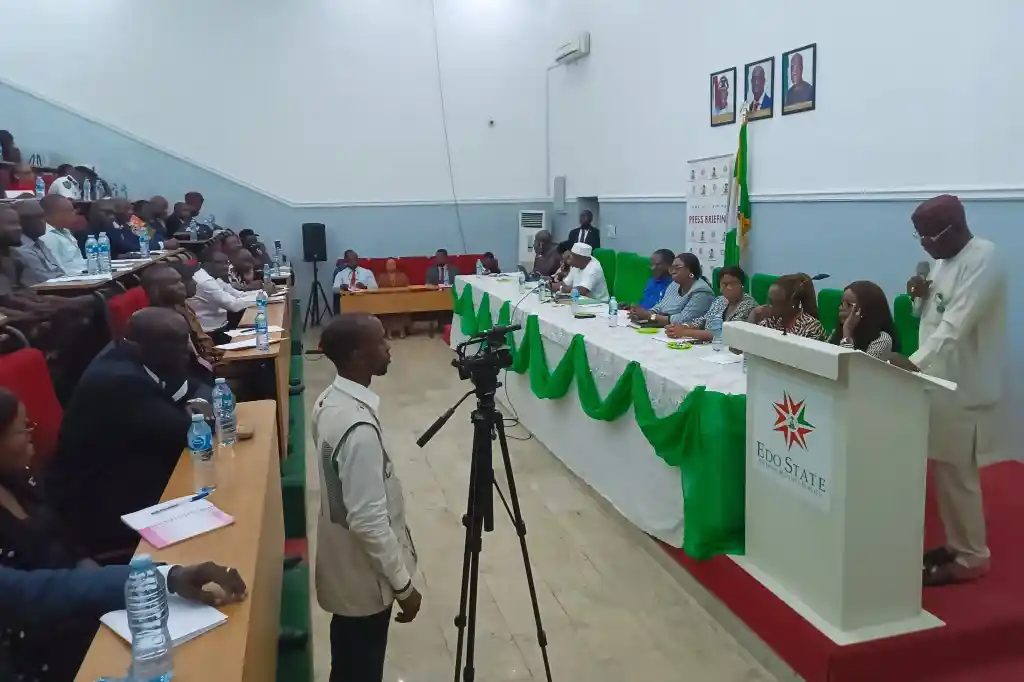Edo State Internal Revenue Service has announced that it has generated N79 billion out of the N100 billion target set by the state government for the 2025 fiscal year in the last nine months.
The Executive Chairman of EIRS, Oladele Bankole-Balogun, disclosed this during an interactive meeting with heads of Ministries, Departments and Agencies, including permanent secretaries and directors, held at the EIRS Corporate Head Office in Benin City, the Edo State capital.
Highlighting the service’s performance, Bankole-Balogun stated that the internally generated revenue for the first half of the year stood at N52.6 billion, representing a 46 percent increase compared to the same period in 2024. He, however, warned that revenue leakages within MDAs pose a major threat to sustainable growth in the state.
To address the challenge, the EIRS chairman revealed that the state government will be adopting the Treasury Single Account as part of policy reforms to improve revenue generation and block leakages. “These results are commendable. Yet, by the standards of the governor, the expectations of Edo people, and the possibilities before us, there is still much more to do,” he said.
He described the TSA as a fundamental tool, stressing that it ensures all government receipts flow through a transparent, centralized account. “It eliminates cash handling, reduces leakages, and improves accountability. Going forward, we will insist that all revenue streams be remitted into the IGR account, with proper digital trails and accountability,” he added.
Bankole-Balogun emphasized the need to close revenue leakages, comply fully with the Treasury Single Account, and align with the Nigerian Tax Reform Acts which will take effect from January 1, 2026. He described revenue as the lifeline of development, insisting that Edo State must position itself as a frontrunner in implementing the new framework.
He explained that the meeting was not just administrative but also a call for unity, collaboration, and shared purpose in building Edo State. “Revenue is not an end in itself; it is a means to better roads, stronger health systems, vibrant education, safe communities, and dignity for all citizens of Edo State,” he said.
According to him, every MDA must become a revenue-generating asset while ensuring compliance with digital systems and TSA requirements. He further highlighted the opportunities in the 2025 Nigerian Tax Reform Acts, which he said consolidate multiple tax laws into a unified Nigeria Tax Act.
Bankole-Balogun explained that the reforms will expand the tax net to cover digital assets and informal commerce, introduce a four percent development levy, and establish new institutions like the Nigeria Revenue Service and a Tax Ombudsman. “The new framework simplifies, digitalises, and makes tax administration more predictable. Edo must align internal processes, adopt e-receipting and digital reporting, and leverage our informal and digital economy for sustainable growth,” he noted.
He urged MDAs handling land, urban planning, permits, and business registrations to strengthen compliance under the restructured stamp duty and real estate provisions. Calling for sustained partnership, he stated, “We do not ask for compliance by fiat, but by reason, trust, systems, and partnership. Think of the untapped potential in land and planning agencies, in building control, in informal trade regulation, in permitting systems, and in new business registration. We invite each of you to own the vision, to embed revenue-conscious thinking in your agencies, and to commit to the discipline that accountability demands.”
On his part, the Executive Director, MDA Services, EIRS, Hon. Jackson Eribo, listed some of the challenges hindering revenue optimization in Edo State. These include illegal opening of revenue accounts, cash collections against the state’s cashless policy, and partial remittances. He also pointed to fragmentation of systems outside the Edo Revenue Administration System and non-compliance with Tax Clearance Certificate requirements.
Eribo stressed that the violation of the state’s cashless policy through cash collections and partial remittances remains a serious concern. He added that the EIRS is working to strengthen monitoring mechanisms and encourage full compliance by all stakeholders.
Altogether, the Edo State Internal Revenue Service said the progress recorded shows clear improvement in internally generated revenue but warned that the reforms must be sustained to achieve the N100 billion target and position the state for long-term growth.

